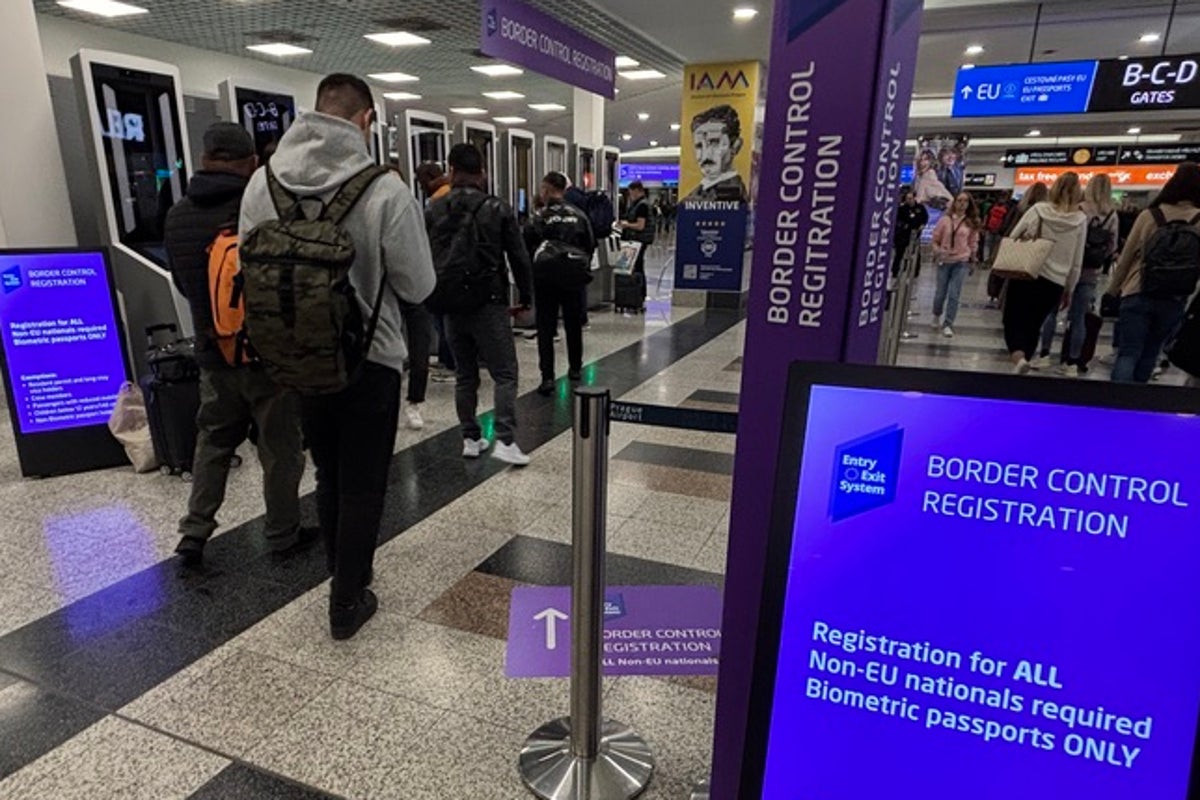“Border Control Registration”: if you travel to the European Union and wider Schengen area, start getting used to the term. This is one of the extra hurdles the British awarded themselves by bravely deciding to take back control and leave the EU.
The entry-exit system (EES) means “third-country nationals” such as the British travelling to the European Union and wider Schengen area must be photographed and fingerprinted at the frontier. To do that, European countries are adding an extra hurdle ahead of the usual passport check.
The process of providing your biometrics is formerly known as Border Control Registration. At many frontiers it comprises a legion of tall kiosks, generally glowing red or green, towering over travellers as they tentatively approach. These machines have been gathering dust at airports around Europe for a year or more, but are now being pressed into action.
I first tussled with the EES hardware and software on the start date for the digital borders scheme, 12 October. I flew to Prague especially to test it out, since the Czech Republic had said it would be going 100 per cent live from day one. Almost all other countries are taking their time.
The process was hardly friction-free: placing your passport and your fingerprints in the correct location in the approved manner is far from intuitive. But what was more troubling was the on-screen interrogation. Travellers are asked for:
- Confirmation of accommodation?
- A return ticket?
- Means of payment?
For the last of these, the Czechs want you to have a daily minimum of €66 (£57) in cash or a credit or debit card. But you will be asked if you have travel insurance. And this is the issue that reader Richard Markson contacted me about.
“Some websites say evidence of travel insurance may be requested when travelling to EU countries,” he wrote. “Is this so?”
Yes – and no. It’s complicated.
The introduction of the much-delayed EES is entirely separate from the conditions a UK traveller must meet for when entering the Schengen zone. They have not changed. So why the sudden upsurge of concern that proof of travel insurance may be demanded? It is all to do with the way the entry-exit system has been deployed by each member state. When setting up kiosks – the country can choose to add the so-called “Schengen questions” to the screen. These are the requirements that, in theory, apply to every third-country national.
The basic Schengen demands are that you have sufficient available funds to support yourself, and either a ticket out of the zone after a short visit or the means to procure one. Each member state can stipulate the amount of money they want to see, and add its own additional conditions for travellers entering the Schengen area through its borders.
The French notionally want to see “an insurance certificate covering all medical and hospital expenses for which you may be liable for the duration of your stay in France, as well as medical repatriation costs and expenses in the event of death”. But until the entry-exit system, British travellers were simply never asked for proof of cover.
To my considerable surprise, the EES kiosks at the Eurostar terminal, London St Pancras International, were programmed with a question about medical insurance. But just 48 hours into the roll-out of the entry-exit system, Simon Lejeune of Eurostar told me the demand had been dropped from the on-screen question. The Port of Dover, too, has deleted the demand. Theoretically the French may reinstate the questions once the roll-out is complete next April, but I bet they don’t.
So why the sudden interest from foreign government about available funds and insurance cover? It seems to be that officials in various interior ministries around Europe decided to follow the letter of the law when composing questions – rather than asking officers on the front line what actually happens.
These “third-country nationals” questions are mainly aimed at visitors from less wealthy countries rather than British weekenders. Since Brexit, border guards have been supposed to check. Sometimes a Dutch or German frontier official will occasionally ask for evidence of a ticket out, but little else.
As Dr Nick Brown, the data sleuth who knows more about the EES than I ever will, puts it: “Most of the questions relate to admission criteria that are checked quite rigorously at the consulate when people who need visas apply for one. They are formally required for everyone, but there is no way that a border official can meaningfully verify them in real time.
“For example, someone coming from an LMIC [low- and middle-income country] will need to show that they have X amount of convertible currency in a bank account.
“A visa-waiver Brit is not going to be asked to bring up the current account and cash ISA balance that back up their debit card.”
Back at Prague airport, I suspect many uninsured arrivals will falsely answer “yes” to the travel insurance question – particularly those on stag and hen adventures. Ironically, they are potentially the people who may need cover the most.
Simon Calder, also known as The Man Who Pays His Way, has been writing about travel for The Independent since 1994. In his weekly opinion column, he explores a key travel issue – and what it means for you.



